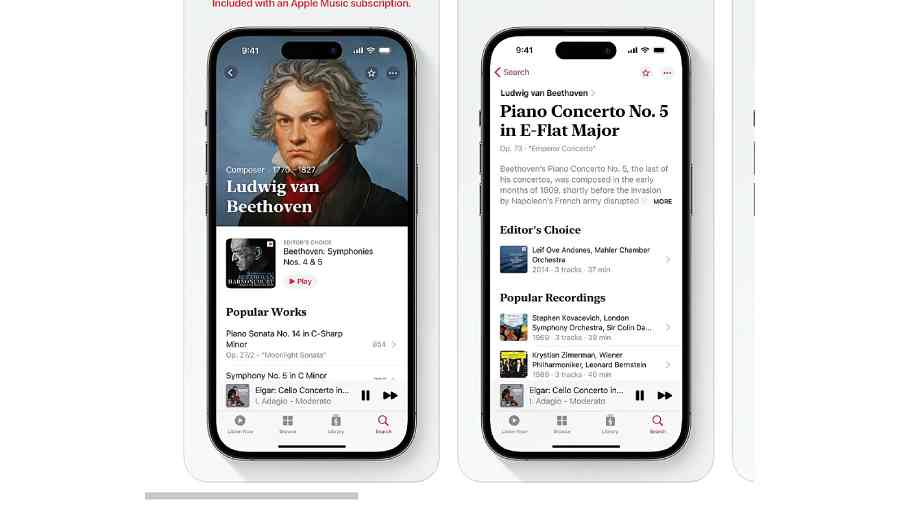The whispers swirling around orchestra pits from London to New York were true. This month, tech giant Apple will launch Apple Music Classical, a streaming service and app featuring the globe’s largest classical music catalogue. The world of streaming — listening to unlimited music through a desktop or smartphone app for a fixed monthly fee — is dominated by pop, rock and hip hop. Its growth has been fuelled by Gen-Z and millennial listeners who prefer Bad Bunny to Bach and think that Chopin is something you do on ASOS.com
It has been five years since streaming services such as Spotify overtook buying or downloading songs as the main way we consume music. And there’s already classical music on its Apple Music streaming platform, as well as on Spotify and small specialist streaming platforms such as Idagio and Stage+. So what if Apple chomps further into the market? Well, nothing has been done on this scale before. Apple Music is set to have 110 million paying subscribers by 2025, according to JP Morgan. The classical catalogue will contain five million tracks.
So how will it work, and what are the hurdles? The first relates to metadata, the digital equivalent of library index cards. This sounds dry, but good streaming relies on whip-smart use of metadata, which describes to the listener the content being streamed and helps them discover new and similar music. In the pop world, metadata is a relatively blunt instrument; listeners search by song or album title, by the artist’s name, or by genre. It’s far more complicated with classical and opera music. Listeners need to be able to search by composer, orchestra, soloist, conductor, record label and interpretation. There are 1,658 recordings of Beethoven’s Fifth Symphony, according to the Discogs website. Where to start? Apple says that “intuitive” browsing features on the classical app will let people search its library by composer, conductor or even a record’s catalogue number.
The second hurdle relates to how performers are paid. Pop singers get money every time their song is streamed for 30 seconds or more, with an average payment of 0.0025p per listen. This system is fine for three-minute, regularly played pop songs. But a single movement of a symphony can last half an hour. Per-track payments won’t cut it. Orchestras need to eat.
There’s a third, more intangible, hurdle: listener satisfaction. Classical fans are a select bunch with deep knowledge who account for just 1 per cent of all music streamed. In classical, sound quality really matters. Apple should be onto a winner here — it has promised its Classical app will feature the highest audio quality, with thousands of recordings in so-called “immersive spatial audio”.
Clues as to how Apple may cope in this brave new world can be found at Idagio, a specialist classical streaming company set up in Germany in 2015 that appears to have got it right. Founder Till Janczukowicz tells me that, on top of complex search technology, Idagio employs 40 human experts to help make recommendations. “If you like Richard Strauss, an amazing recommendation is Karol Szymanowski’s Concert Overture,” says Janczukowicz. “Why? Because a young Szymanowski was an epigone of Strauss. In the same way, the young Alexander Scriabin was inspired by Frederic Chopin. This is something our curators know.” The company works with musicologists to build its music database. Its founder says it offers the one thing that no computer can: “taste”.
When it comes to payments, Idagio ensures that money is fairly distributed. It pays its artists by the second rather than by the track. And it distributes an individual subscriber’s euros 9.99 monthly fee directly to the artists that the subscriber listens to, rather than pooling all money and giving the greatest amount to the most-listened-to musicians overall. Apple would do well to follow suit.
From what Apple has said so far, it will embrace its inner nerd. The company says it’s working with “renowned classical music institutions” to offer new and exclusive content. It will also offer “deep dives” into key works, insightful composer biographies and hundreds of curated playlists and “thousands” of exclusive albums. The content certainly sounds rich and copious.
THE DAILY TELEGRAPH











